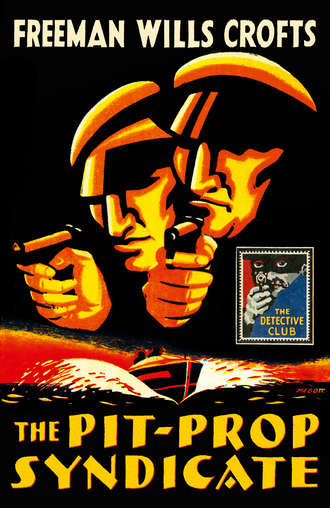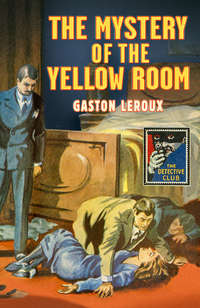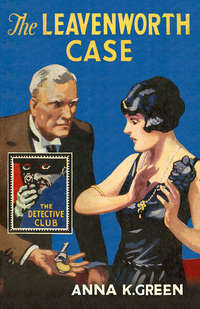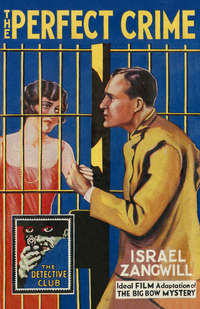
Полная версия
The Pit-Prop Syndicate
‘By Jove, what an extraordinary stroke of luck!’ Hilliard went on eagerly. ‘All three of them that know you out of the way! We can go down to the place now and ask for Mr Coburn, and maybe we shall have a chance to see inside of that shed. Let’s go at once, before they come back.’
They crawled away from their point of vantage into the wood, and retracing their steps to the boat, put it together and carried it to the river. Then rowing up-stream, they reached the end of the wharf, where a flight of wooden steps came down into the stream. Here they went ashore, after making the painter fast to the woodwork.
The front of the wharf, they had seen from the boat, was roughly though strongly made. At the actual edge, there was a row of almost vertical piles, pine trees driven unsquared. Behind these was a second row, inclined inwards. The feet of both rows seemed to be pretty much in the same line, but the tops of the raking row were about six feet behind the others, the arrangement, seen from the side, being like a V of which one leg is vertical. These tops were connected by beams, supporting a timber floor. Behind the raking piles rough tree stems had been laid on the top of each other horizontally to hold back the earth filled behind them. The front was about a hundred feet long, and was set some thirty feet out in the river.
Parallel to the front and about fifty feet behind it was the wall of the shed. It was pierced by four doors, all of which were closed, but out of each of which ran a line of narrow gauge railway. These lines were continued to the front of the wharf and there connected up by turn-tables to a cross line, evidently with the idea that a continuous service of loaded trucks could be sent out of one door, discharged, and returned as empties through another. Stacks of pit-props stood ready for loading between the lines.
‘Seems a sound arrangement,’ Hilliard commented as they made their inspection.
‘Quite. Anything I noticed before struck me as being efficient.’
When they had seen all that the wharf appeared to offer, they walked round the end of the shed. At the back were a number of doors, and through these also narrow gauge lines were laid which connected with those radiating to the edge of the clearing. Everywhere between the lines were stacks of pit-props as well as of blocks and cuttings. Three or four of the doors were open, and in front of one of them, talking to some one in the building, stood a man.
Presently he turned and saw them. Immediately they advanced and Hilliard accosted him.
‘Good-morning. We are looking for Mr Coburn. Is he about?’
‘No, monsieur,’ the man answered civilly, ‘he has gone into Bordeaux. He won’t be back until the afternoon.’
‘That’s unfortunate for us,’ Hilliard returned conversationally. ‘My friend and I were passing up the river on our launch, and we had hoped to have seen him. However, we shall get hold of him later. This is a fine works you have got here.’
The man smiled. He seemed a superior type to the others and was evidently a foreman.
‘Not so bad, monsieur. We have four saws, but only two are running today.’ He pointed to the door behind him as he spoke, and the two friends passed in as if to have an idle look round.
The interior was fitted up like that of any other sawmill, but the same element of design and efficiency seemed apparent here as elsewhere. The foreman explained the process. The lopped trunks from the wood came in by one of two roads through a large door in the centre of the building. Outside each road was a saw, its axle running parallel to the roads. The logs were caught in grabs, slung on to the table of the saws and, moving automatically all the time, were cut into lengths of from seven to ten feet. The pieces passed for props were dumped on to a conveyor which ran them out of the shed to be stacked for seasoning and export. The rejected pieces by means of another conveyor moved to the third and fourth saws, where they were cut into blocks for firewood, being finally delivered into two large bins ready for loading onto the lorries.
The friends exhibited sufficient non-technical interest to manage to spend a good deal of time over their survey, drawing out the foreman in conversation and seeing as much as they could. At one end of the shed was the boiler house and engine room, at the other the office, with between it and the mill proper a spacious garage in which, so they were told, the six lorries belonging to the syndicate were housed. Three machines were there, two lying up empty, the third, with engine running and loaded with blocks, being ready to start. They would have liked to examine the number plate, but in the presence of the foreman it was hardly possible. Finally they walked across the clearing to where felling and lopping was in progress, and inspected the operations. When they left shortly after with a promise to return to meet Mr Coburn, there was not much about the place that they had missed.
‘That business is just as right as rain,’ Merriman declared when they were once more in the boat. ‘And that foreman’s all right too. I’d stake my life he wasn’t hiding anything. He’s not clever enough for one thing.’
‘So I think too,’ Hilliard admitted. ‘And yet, what about the game with the number plates? What’s the idea of that?’
‘I don’t know. But all the same I’ll take my oath there’s nothing wrong about the timber trade. It’s no go, Hilliard. Let’s drop chasing wild geese and get along with our trip.’
‘I feel very like it,’ the other replied as he sucked moodily at his pipe. ‘We’ll watch for another day or so, and if we see nothing suspicious we can clear out.’
But that very evening an incident occurred which, though trifling, revived all their suspicions and threw them once again into a sea of doubt.
Believing that the Coburns would by that time have returned, they left the launch about five o’clock to call. Reaching the edge of the clearing almost directly behind the house, they passed round the latter and rang.
The door was opened by Miss Coburn herself. It happened that the sun was shining directly in her eyes, and she could not therefore see her visitors’ features.
‘You are the gentlemen who wished to see Mr Coburn, I presume?’ she said before Merriman could speak. ‘He is at the works. You will find him in his office.’
Merriman stepped forward, his cap off.
‘Don’t you remember me, Miss Coburn,’ he said earnestly. ‘I had the pleasure of meeting you in May, when you were so kind as to give me petrol to get me to Bordeaux.’
Miss Coburn looked at him more carefully, and her manner, which had up to then been polite, but coolly self-contained, suddenly changed. Her face grew dead white and she put her hand sharply to her side, as though to check the rapid beating of her heart. For a moment she seemed unable to speak, then, recovering herself with a visible effort, she answered in a voice that trembled in spite of herself:
‘Mr Merriman, isn’t it? Of course I remember. Won’t you come in. My father will be back directly.’
She was rapidly regaining self-control, and by the time Merriman had presented Hilliard her manner had become almost normal. She led the way to a comfortably furnished sitting-room looking out over the river.
‘Hilliard and I are on a motor launch tour across France,’ Merriman went on. ‘He worked from England down the coast to Bordeaux, where I joined him, and we hope eventually to cross the country to the Mediterranean and do the Riviera from the sea.’
‘How perfectly delightful,’ Miss Coburn replied. ‘I envy you.’
‘Yes, it’s very jolly doing these rivers and canals,’ Hilliard interposed. ‘I have spent two or three holidays that way now, and it has always been worth while.’
As they chatted on in the pleasant room the girl seemed completely to have recovered her composure, and yet Merriman could not but realise a constraint in her manner, and a look of anxiety in her clear brown eyes. That something was disturbing her there could be no doubt, and that something appeared to be not unconnected with himself. But, he reasoned, there was nothing connected with himself that could cause her anxiety, unless it really was that matter of the number plates. He became conscious of an almost overwhelming desire to share her trouble whatever it might be, to let her understand that so far from willingly causing a shadow to fall across her path there were few things he would not do to give her pleasure; indeed, he began to long to take her in his arms, to comfort her …
Presently a step in the hall announced Mr Coburn’s return.
‘In here, daddy,’ his daughter called and the steps approached the door.
Whether by accident or design it happened that Miss Coburn was seated directly opposite the door, while her two visitors were placed where they were screened by the door itself from the view of any one entering. Hilliard, his eyes on the girl’s face as her father came in, intercepted a glance of what seemed to be warning. His gaze swung round to the newcomer, and here again he noticed a start of surprise and anxiety as Mr Coburn recognised his visitor. But in this case it was so quickly over that had he not been watching intently he would have missed it. However, slight though it was, it undoubtedly seemed to confirm the other indications which pointed to the existence of some secret in the life of these two, a secret shared apparently by the good-looking driver and connected in some way with the lorry number plates.
Mr Coburn was very polite, suave and polished as an accomplished man of the world. But his manner was not really friendly, in fact, Hilliard seemed to sense a veiled hostility. A few deft questions put him in possession of the travellers’ ostensible plans, which he discussed with some interest.
‘But,’ he said to Hilliard, ‘I am afraid you are in error in coming up this River Lesque. The canal you want to get from here is the Midi, it enters the Mediterranean not far from Narbonne. But the connection from this side is from the Garonne. You should have gone up-stream to Langon, nearly forty miles above Bordeaux.’
‘We had hoped to go from still farther south,’ Hilliard answered. ‘We have penetrated a good many of the rivers, or rather I have, and we came up here to see the sand-dunes and forests of the Landes, which are new to me. A very desolate country, is it not?’
Mr Coburn agreed, continuing courteously:
‘I am glad at all events that your researches have brought you into our neighbourhood. We do not come across many visitors here, and it is pleasant occasionally to speak one’s own language to some one outside one’s household. If you will put up with pot-luck I am sure we should both be glad—’ he looked at his daughter ‘—if you would wait and take some dinner with us now. Tomorrow you could explore the woods, which are really worth seeing though monotonous, and if you are at all interested I should like to show you our little works. But I warn you the affair is my hobby, as well as my business for the time being, and I am apt to assume others have as great an interest in it as myself. You must not let me bore you.’
Hilliard, suspicious and critically observant, wondered if he had not interrupted a second rapid look between father and daughter. He could not be sure, but at all events the girl hastened to second her father’s invitation.
‘I hope you will wait for dinner,’ she said. ‘As he says, we see so few people, and particularly so few English, that it would be doing us a kindness. I’m afraid that’s not very complimentary—’ she laughed brightly—‘but it’s at least true.’
They stayed, and enjoyed themselves. Mr Coburn proved himself an entertaining host, and his conversation, though satirical, was worth listening to. He and Hilliard talked, while Merriman, who was something of a musician, tried over songs with Miss Coburn. Had it not been for an uneasy feeling that they were to some extent playing the part of spies, the evening would have been a delight to the visitors.
Before they left for the launch it was arranged that they should stay over the following day, lunch with the Coburns, and go for a tramp through the forest in the afternoon. They took their leave with cordial expressions of good will.
‘I say, Merriman,’ Hilliard said eagerly as they strolled back through the wood, ‘did you notice how your sudden appearance upset them both? There can be no further doubt about it, there’s something. What it may be I don’t know, but there is something.’
‘There’s nothing wrong at all events,’ Merriman asserted doggedly.
‘Not wrong in the sense you mean, no,’ Hilliard agreed quickly, ‘but wrong for all that. Now that I have met Miss Coburn I can see that your estimate of her was correct. But any one with half an eye could see also that she is frightened and upset about something. There’s something wrong, and she wants a helping hand,’
‘Damn you, Hilliard, how you talk,’ Merriman growled with a sudden wave of unreasoning rage. ‘There’s nothing wrong and no need for our meddling. Let us clear out and go on with our trip.’
Hilliard smiled under cover of darkness.
‘And miss our lunch and excursion with the Coburns tomorrow?’ he asked maliciously.
‘You know well enough what I mean,’ Merriman answered irritably. ‘Let’s drop this childish tomfoolery about plots and mysteries and try to get reasonably sane again. Here,’ he went on fiercely as the other demurred, ‘I’ll tell you what I’ll do if you like. I’ll have no more suspicions or spying, but I’ll ask—her—if there is anything wrong: say I thought there was from her manner and ask her the direct question. Will that please you?’
‘And get well snubbed for your pains?’ Hilliard returned. ‘You’ve tried that once already. Why did you not persist in your inquiries about the number plate when she told you about that driver’s shell-shock?’
Merriman was silent for a few moments, then burst out:
‘Well, hang it all, man, what do you suggest?’
During the evening an idea had occurred to Hilliard and he returned to it now.
‘I’ll tell you,’ he answered slowly, and instinctively he lowered his voice. ‘I’ll tell you what we must do. We must see their steamer loaded. I’ve been thinking it over. We must see what, if anything, goes on board that boat beside pit-props.’
Merriman only grunted in reply, but Hilliard, realising his condition, was satisfied.
And Merriman, lying awake that night on the port locker of the Swallow, began himself to realise his condition, and to understand that his whole future life and happiness lay between the dainty hands of Madeleine Coburn.
CHAPTER V
THE VISIT OF THE ‘GIRONDIN’
NEXT morning found both the friends moody and engrossed with their own thoughts.
Merriman was lost in contemplation of the new factor which had come into his life. It was not the first time he had fancied himself in love. Like most men of his age he had had affairs of varying seriousness, which in due time had run their course and died a natural death. But this, he felt, was different. At last he believed he had met the one woman, and the idea thrilled him with awe and exultation, and filled his mind to the exclusion of all else.
Hilliard’s preoccupation was different. He was considering in detail his idea that if a close enough watch could be kept on the loading of the syndicate’s ship it would at least settle the smuggling question. He did not think that any article could be shipped in sufficient bulk to make the trade pay, unnoticed by a skilfully concealed observer. Even if the commodity were a liquid—brandy, for example—sent aboard through a flexible pipe, the thing would be seen.
But two unexpected difficulties had arisen since last night. Firstly, they had made friends with the Coburns. Excursions with them were in contemplation, and one had actually been arranged for that very day. While in the neighbourhood they had been asked virtually to make the manager’s house their headquarters, and it was evidently expected that the two parties should see a good deal of each other. Under these circumstances how were the friends to get away to watch the loading of the boat?
And then it occurred to Hilliard that here, perhaps, was evidence of design; that this very difficulty had been deliberately caused by Mr Coburn with the object of keeping himself and Merriman under observation and rendering them harmless. This, he recognised, was guesswork, but still it might be the truth.
He racked his brains to find some way of meeting the difficulty, and at last, after considering many plans, he thought he saw his way. They would as soon as possible take leave of their hosts and return to Bordeaux, ostensibly to resume their trip east. From there they would come out to the clearing by road, and from the observation post they had already used keep a close eye on the arrival of the ship and subsequent developments. At night they might even be able to hide on the wharf itself. In any case they could hardly fail to see if anything other than pit-props was loaded.
So far, so good, but there was a second and more formidable difficulty. Would Merriman consent to this plan and agree to help? Hilliard was doubtful. That his friend had so obviously fallen in love with this Madeleine Coburn was an unexpected and unfortunate complication. He could, of course, play on the string that the girl was in danger and wanted help, but he had already used that with disappointing results. However, he could see nothing for it but to do his best to talk Merriman round.
Accordingly, when they were smoking their after breakfast pipes, he broached the subject. But as he had feared, his friend would have none of it.
‘I tell you I won’t do anything of the kind,’ he said angrily. ‘Here we come, two strangers, poking our noses into what does not concern us, and we are met with kindness and hospitality and invited to join a family party. Good Lord, Hilliard, I can’t believe that it is really you that suggest it! You surely don’t mean that you believe that the Coburns are smuggling brandy?’
‘Of course not, you old fire-eater,’ Hilliard answered good-humouredly, ‘but I do believe, and so must you, that there is something queer going on. We want to be sure there is nothing sinister behind it. Surely, old man, you will help me in that?’
‘If I thought there was anything wrong you know I’d help you,’ Merriman returned, somewhat mollified by the other’s attitude. ‘But I don’t. It is quite absurd to suggest the Coburns are engaged in anything illegal, and if you grant that your whole case falls to the ground.’
Hilliard saw that for the moment at all events he could get no more. He therefore dropped the subject and they conversed on other topics until it was time to go ashore.
Lunch with their new acquaintances passed pleasantly, and after it the two friends went with Mr Coburn to see over the works. Hilliard thought it better to explain that they had seen something of them on the previous day, but notwithstanding this assurance Mr Coburn insisted on their going over the whole place again. He showed them everything in detail, and when the inspection was complete both men felt more than ever convinced that the business was genuine, and that nothing was being carried on other than the ostensible trade. Mr Coburn, also, gave them his views on the enterprise, and these seemed so eminently reasonable and natural that Hilliard’s suspicions once more became dulled, and he began to wonder if their host’s peculiar manner could not have been due to some cause other than that he had imagined.
‘There is not so much money in the pit-props as I had hoped,’ Mr Coburn explained. ‘When we started here the Baltic trade, which was, of course, the big trade before the war, had not revived. Now we find the Baltic competition growing keener, and our margin of profit is dwindling. We are handicapped also by having only a one way traffic. Most of the Baltic firms exporting pit-props have an import trade in coal as well. This gives them double freights and pulls down their overhead costs. But it wouldn’t pay us to follow their example. If we ran coal it could only be to Bordeaux, and that would take up more of our boat’s time than it would be worth.’
Hilliard nodded and Mr Coburn went on:
‘On the other hand, we are doing better in what I may call “sideshows”. We’re getting quite a good price for our firewood, and selling more and more of it. Three large firms in Bordeaux have put in wood-burning fireboxes and use nothing else, and two others are thinking of following suit. Then I am considering two developments; in fact, I have decided on the first. We are going to put in an air compressor in our engine-room, and use pneumatic tools in the forest for felling and lopping. I estimate that will save us six men. Then I think there would be a market for pine paving blocks for streets. I haven’t gone into this yet, but I’m doing so.’
‘That sounds very promising,’ Hilliard answered. ‘I don’t know much about it, but I believe soft wood blocks are considered better than hard.’
‘They wear more evenly, I understand. I’m trying to persuade the Paris authorities to try a piece of it, and if that does well it might develop into a big thing. Indeed, I can imagine our giving up the pit-props altogether in the future.’
After a time Miss Coburn joined them, and, the Ford car being brought out, the party set off on their excursion. They visited a part of the wood where the trees were larger than near the sawmill, and had a pleasant though uneventful afternoon. The evening they spent as before at the Coburn’s house.
Next day the friends invited their hosts to join them in a trip up the river. Hilliard tactfully interested the manager in the various ‘gadgets’ he had fitted up in the launch, and Merriman’s dream of making tea with Miss Coburn materialised. The more he saw of the gentle, brown-eyed girl, the more he found his heart going out to her, and the more it was borne in on him that life without her was becoming a prospect more terrible than he could bring himself to contemplate.
They went up-stream on the flood tide for some twenty miles, until the forest thinned away and they came on vineyards. There they went ashore, and it was not until the shades of evening were beginning to fall that they arrived back at the clearing.
As they swung round the bend in sight of the wharf Mr Coburn made an exclamation.
‘Hallo!’ he cried. ‘There’s the Girondin. She has made a good run. We weren’t expecting her for another three or four hours.’
At the wharf lay a vessel of about 300 tons burden, with bluff, rounded bows sitting high up out of the water, a long, straight waist, and a bridge and cluster of deck-houses at the stern.
‘Our motor ship,’ Mr Coburn explained with evident pride. ‘We had her specially designed for carrying the pit-props, and also for this river. She only draws eight feet. You must come on board and have a look over her.’
This was of all things what Hilliard most desired. He recognised that if he was allowed to inspect her really thoroughly, it would finally dispel any lingering suspicion he might still harbour that the syndicate was engaged in smuggling operations. The two points on which that suspicion had been founded—the absence of return cargoes and the locality of the French end of the enterprise—were not, he now saw, really suspicious at all. Mr Coburn’s remarks met the first of these points, and showed that he was perfectly alive to the handicap of a one way traffic. The matter had not been material when the industry was started, but now, owing to the recovery of the Baltic trade after the war, it was becoming important, and the manager evidently realised that it might easily grow sufficiently to kill the pit-prop trade altogether. And the locality question was even simpler. The syndicate had chosen the pine forests of the Landes for their operations because they wanted timber close to the sea. On the top of these considerations came the lack of secrecy about the ship. It could only mean that there really was nothing aboard to conceal.
On reaching the wharf all four crossed the gangway to the deck of the Girondin. At close quarters she seemed quite a big boat. In the bows was a small forecastle, containing quarters for the crew of five men as well as the oil tanks and certain stores. Then amidships was a long expanse of holds, while aft were the officers’ cabins and tiny mess room, galley, navigating bridge, and last, but not least, the engine-room with its set of Diesel engines. She seemed throughout a well-appointed boat, no money having apparently been spared to make her efficient and comfortable.






